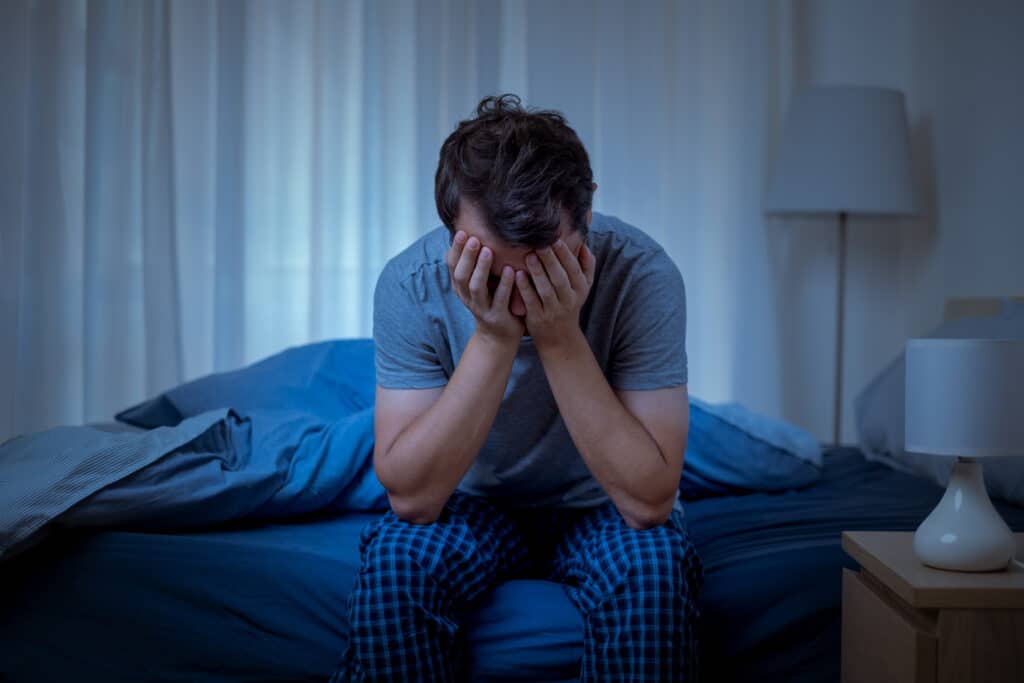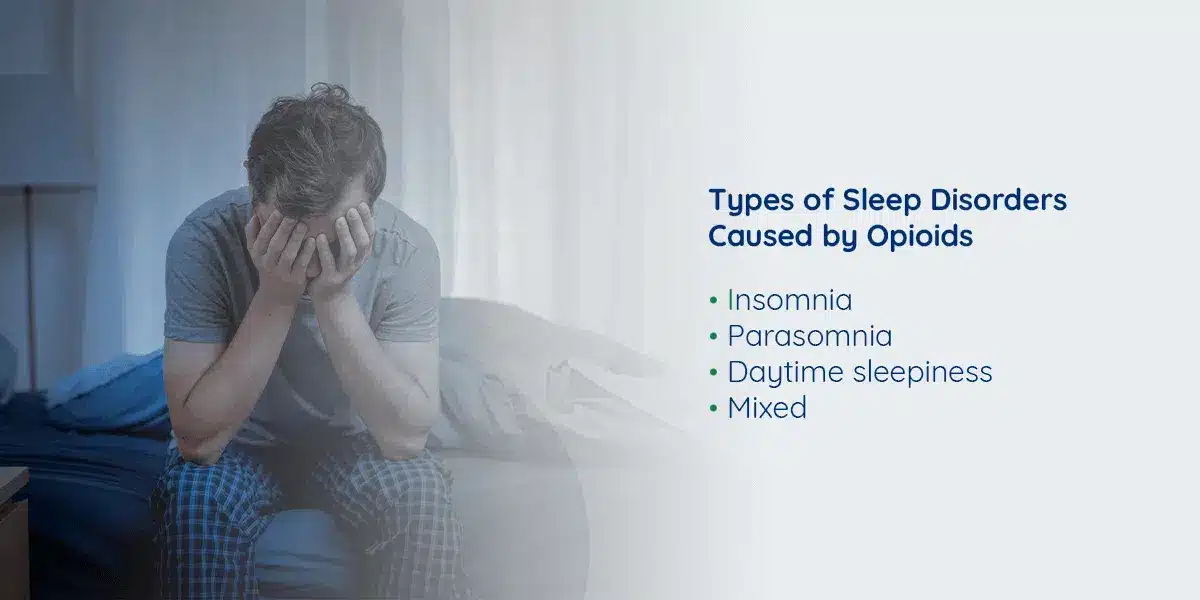Most people are aware that opioids can negatively affect many aspects of life. One problem opioids can cause is problems with sleep. They can create issues with sleep quality, falling asleep or conditions like sleep apnea. When your sleep is disrupted, you can experience various complications, such as mood swings, stress, memory problems and an overall reduction in the quality of life. Long-term sleep disruptions can even cause hypertension, cardiovascular disease and metabolic disorders.
This guide will provide an overview of the effects of opioids on sleep and how you can manage opioid-induced sleep disorders.
[maxbutton id=”2″]
How Opioids Can Negatively Affect Sleep
The overall quality of sleep can be adversely affected by opioids, such as Vicodin and oxycodone. A study conducted by Penn State University stated that patients reporting lower sleep quality were associated with intense drug cravings. The results of the study make it clear that a lack of sleep creates a risk factor in addiction recovery.
Sleep issues could include restless sleep, waking frequently throughout the night or sleep disorders. There are different levels of sleep, some mentioned below, that should be experienced each time a person goes through a sleep cycle. Drug use can interrupt or diminish these cycles and impact a person’s quality of life. The number of overall hours a person sleeps can be affected as well.
Types of Sleep Disorders Caused by Opioids
When opioids interfere with sleep, they can cause four different types of sleep problems. They affect patients’ sleep patterns in a variety of ways. Some people have one type of sleep issue, while others have more than one. If you’re experiencing sleep disruptions or chronic fatigue, you may have an opioid-induced sleep disorder, such as:
- Insomnia: Many patients have sleep deprivation from opioids related to trouble falling asleep, difficulty staying asleep or not getting restful sleep. They may also not feel rested from normal sleep.
- Parasomnia: Since opioids interfere with your sleep patterns and cycle, they can also cause abnormal behaviors during sleep. Behaviors such as sleepwalking, speaking and even eating are common among people with parasomnia. During a parasomnia episode, it may seem like you’re awake when you’re really asleep. These behaviors make your sleep less restful and pose potential dangers. For example, sleepwalking can result in falls since you’re unaware of your surroundings in your sleep.
- Daytime sleepiness: Opioids can cause excessive sleepiness during the day. Sometimes this tiredness comes from sleep issues, while it has no clear explanation in other cases. Excessive sleepiness during the day can cause problems at work, school and in relationships. Daytime sleepiness can also be dangerous, especially if someone is driving and nodding off.
- Mixed: A person who uses opioids could also have a combination of the above symptoms with no predominant type. For example, they might have daytime sleepiness alongside unusual behaviors during sleep.
If you use opioids and experience any of these symptoms, you could have an opioid-induced sleep disorder. These sleep disorders can cause these issues if you have opioid use disorder or take them regularly for pain. High doses of opioids can also impact the body’s ability to breathe correctly during the sleep cycle.
How Opioids Impact Sleep
Using opioids can create the above symptoms because of their biological and chemical reactions with the body. Opioids can also mix with other medications you’re taking to develop more extensive sleep problems. The following sleep problems can happen if you misuse opioids.
Disturbed REM Patterns
Opioid use is known to disrupt and even block access to REM sleep. REM sleep, which stands for rapid eye movement, is one of the most important stages of sleep and occurs three to five times during the night. REM sleep accounts for between 20 percent and 25 percent of sleep each night for an adult.
Adequate REM sleep is related to the ability to learn and retain memory. Disrupted REM sleep in those using opioids may negatively affect these areas. Ironically, poor sleep patterns can ultimately increase the amount of pain an individual experiences. Thus, the cycle of increased pain and opioid use is perpetuated.
Disrupted Non-REM Patterns
Non-REM sleep is also called non-rapid eye movement or NREM. NREM sleep occurs in three stages that lead up to REM sleep.
- Stage One: This is the lightest stage and, sometimes called “drowsy” sleep.
- Stage Two: This is considered the first official stage of sleep. This is considered light sleep.
- Stage Three: This stage is considered deep sleep. Many critical restorative processes occur during this stage.
Modern Medicine Network has reported that opioid use can particularly disrupt the third and fourth stages of sleep. The deeper stage of NREM is critical in the repair of muscle and bone tissue and the strengthening of the immune system. Those who have struggled with extensive opioid use may experience vivid dreams and nightmares during the REM stage.
Increase in Sleep Apnea
Sleep apnea is a condition in which someone’s breathing will stop and start again while the person is sleeping. The use of opiates can contribute to this condition, as noted by the Cleveland Clinic Journal of Medicine. There are generally three types of sleep apnea:
- Central Sleep Apnea: This is when the muscles controlling breathing don’t get the correct signals from the brain.
- Obstructive Sleep Apnea: This is caused when a person’s throat muscles become extremely relaxed.
- Complex Sleep Apnea: This is a combination of both central and obstructive sleep apnea.
Disruption of General Breathing Patterns
According to the Chest Journal, there is a clear connection between sleep-disordered breathing (SDB) and the use of opioids. Even if an individual doesn’t specifically experience sleep apnea, opioids can still alter and cause dysfunction in breathing patterns. Some neural sites that are particularly sensitive to opioids control breathing rhythms. Respiratory depression, in some cases, can be fatal.
Opioids can negatively affect sleep and affect your overall good health. When seeking treatment for opioid addiction, it’s important to find a facility that provides effective programs while focusing on each individual’s specific needs. It’s necessary to choose a facility that offers a comprehensive program that focuses on physical and mental health.
Cycles of Opioid Use and Sleep Issues
Drugs such as opioids that have a sedative effect can cause a cycle of use and sleep problems. In some cases of opioid-induced sleep disorders, the person who uses opioids takes them in an attempt to relax. The opioids instead interfere with sleep, causing the person to think they need to take more of them. These behaviors result in a cycle that can make addiction more severe. Learning the right coping skills and getting help from addiction professionals can help.
How to Manage Opioid-Induced Sleep Disorders
If you have sleeping issues due to taking opioids for pain or addiction, you can take steps to improve your sleep. After you talk with a doctor about reducing or discontinuing your opioid use, you can try these sleep-promoting habits:
- Exercising regularly: Exercise helps you maintain your energy by giving you an outlet to expend it. Regular exercise can help you fall asleep faster and improve the quality of your sleep.
- Waking up and getting to bed at regular times: When you maintain a sleep schedule, your circadian rhythm encourages regulated sleep. On average, adults need around seven to nine hours of sleep each night.
- Managing stress: Learning how to manage stress will allow you to better relax in bed. Coping mechanisms and healthy habits, such as yoga or meditation can help you reduce stress.
- Eating a nutritious diet: Sugary foods can keep you awake through the night or make you feel sleepy during the day, which impacts your natural circadian rhythm. A good diet will improve your overall health, helping you sleep.
It’s essential that you talk with your dedicated medical professional about any sleep or opioid prescription problems you’re experiencing. Your doctor can help you determine the best treatment method to use to address any symptoms you’re experiencing due to opioid use. They may recommend seeking out help from a specialized treatment center. An opioid use disorder treatment center can help you develop more coping skills for your sleep and address the underlying causes of your opioid use.
Get Help From a Medication-Assisted Treatment (MAT) Clinic Near You
A medication-assisted treatment (MAT) program can help you overcome an opioid use disorder and the symptoms associated with withdrawals. BAART programs offer quality treatment and counseling to help patients recover from addiction. Our programs are accredited by the Commission on Accreditation and Rehabilitation Facilities (CARF), demonstrating our commitment to improving the quality of life for each of our patients. With over 40 years of experience, we can help you on your journey to recovery.
To learn more about opioids and sleep or get help with opioid use disorder, we welcome you to contact a BAART Programs location near you. We have multiple locations across the western United States with additional affiliate locations in the U.S so that you can find a treatment clinic close to home. You can message our team online or call us at 844-341-4040.





